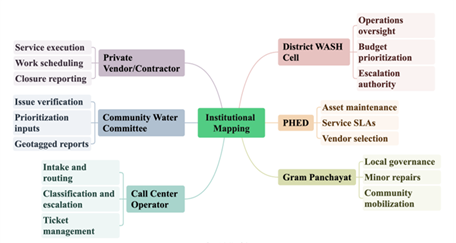Prioritizing Grievance Redressal in Community Based WASH Helpline Systems
Main Article Content
Abstract
This paper presents a theory-grounded triage framework for rural water, sanitation, and hygiene (WASH) helplines, where growing, heterogeneous grievances and limited repair capacity strain responsiveness and risk eroding trust. The operational gap is the absence of integrative prioritization that connects technical fault signatures with socio-institutional determinants while balancing urgency, population impact, vulnerability, repairability, and accountability under scarce resources. We develop a reproducible pipeline that consolidates call and SMS/app logs, maintenance records, geospatial context, and asset data; encodes a transparent weighted-sum prioritization matrix with non-compensatory safety and vulnerability gates; and elicits weights via Analytic Hierarchy Process (AHP) and Delphi, with coding reliability and data governance safeguards. Outcomes are protocol-ready rather than numeric: the framework specifies measurable indicators, benchmarking scenarios, and robustness checks, including precision, recall, F1 score (F1), Root Mean Squared Error (RMSE), time-to-resolution, cost-per-issue, and equity-disaggregated metrics, with baselines such as chronological processing and severity heuristics. The contribution is a transparent, auditable triage design that couples technical scoring with institutional mapping and participatory weighting to support observation and fairness in resource-limited contexts. Practical deployment enables districts to prioritize repairs consistently, document accountability, and improve timeliness and equity while accommodating data noise, missingness, and capacity constraints.
Article Details

This work is licensed under a Creative Commons Attribution-ShareAlike 4.0 International License.

